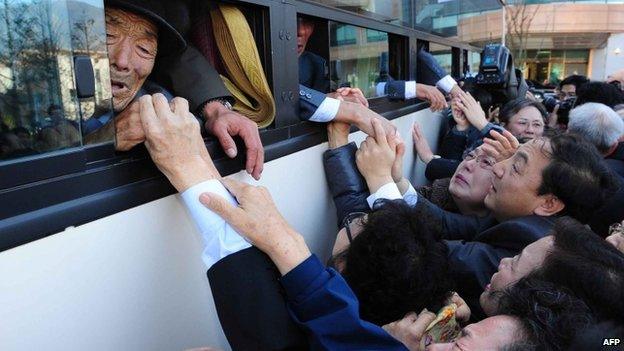Koreas agree to family reunions in February
- Published
BBC's Lucy Williamson: "Today's negotiations began with a handshake and ended with a deal"
North and South Korea have agreed to hold reunions for families separated after the Korean War, following calls from Pyongyang to improve ties.
The reunions are scheduled to take place in February. If held, they would be the first reunions since 2010.
In September, the North cancelled a planned reunion, blaming "hostility" from the South.
The move comes ahead of annual US-South Korea military drills later this month, which are expected to anger the North.
Pyongyang has asked Seoul to cancel the annual drills - a request that has been refused.
North Korea has in the past cancelled or suspended reunion meetings in retaliation for South Korean actions it opposes. Critics have accused the North of using reunions as a bargaining chip.

Families meet briefly at the reunion events before returning to their respective homes
Waiting list
Millions were separated from their families by the division of the Korean peninsula after the 1950-1953 war.
The reunion events are highly emotional occasions where North and South Koreans meet briefly in the North before heading home again.
Yeo In-chan is on the waiting list to meet his older brother, who would now be 83.
"I'm happy that the reunions may go ahead, but I think the number of people taking part is too limited," he told the BBC.
"People who have been selected this time may be excited. But think about the majority of those who will be left behind: they have to watch other families reunite on television, and for them the pain is greater than the joy."
South Korea has used a lottery system in the past to help determine who is to be included.
The process in North Korea, on the other hand, is more opaque, with critics saying Pyongyang plays politics with the families involved.
The reunions are scheduled to be held from 20 February to 25 February, at the Mount Kumgang resort in North Korea.
Before Wednesday's meeting, Lee Duk-haeng, head of South Korea's delegation, said: "We will make all-out efforts to come up with good results such as on a schedule for the family reunion so that we can deliver good news to separated families.
"We will do our best to start the new year off on the right foot for the South-North relationship."
It is estimated that there are about 72,000 South Koreans - nearly half of them aged over 80 - on the waiting list for a chance to join the family reunion events.
However, only a few hundred participants are selected each time. Most do not know whether their relatives are still alive, because the two countries prevent their citizens from exchanging mail, phone calls and emails.
It is a rare glimpse of co-operation on the peninsula, after years of deteriorating ties, the BBC's Lucy Williamson in Seoul reports.
The programme was suspended after the North's shelling of a South Korean border island in November 2010.
In September, Pyongyang cancelled the planned reunions of 100 families, blaming South Korea's "confrontational attitude".
Last month, North Korea began urging an end to slander and "hostile acts", but many in the South remain sceptical that warmer ties are so easy to secure, our correspondent adds.
Last year, the military exercises, known as "Foal Eagle", led to an unusually sharp and protracted surge in tensions. The North threatened pre-emptive nuclear strikes, as nuclear-capable US stealth bombers flew practice runs over the peninsula.